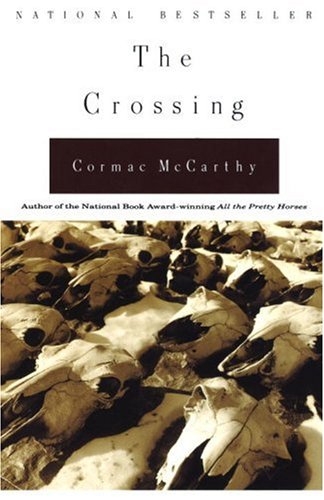 The Crossing is the second novel in Cormac McCarthy's so-called Border Trilogy. It tells the story of Billy Parham, a young man from New Mexico, who travels three separate times through Mexico in order to accomplish some personal mission. Along the way he encounters various drifters, cripples, gypsies, and aging revolutionaries who dispense wisdom and insight about the world.
The Crossing is the second novel in Cormac McCarthy's so-called Border Trilogy. It tells the story of Billy Parham, a young man from New Mexico, who travels three separate times through Mexico in order to accomplish some personal mission. Along the way he encounters various drifters, cripples, gypsies, and aging revolutionaries who dispense wisdom and insight about the world.While The Crossing is the second book in the Border Trilogy, it really stands on its own as a novel. It begins about a decade before the events of All the Pretty Horses, the first Border novel, and is similar to it in basic theme only. While All the Pretty Horses is much more reader-friendly (with lots of page-turning action and romance), The Crossing seems unconcerned about giving the reader an exciting plot. In fact, plot often takes second place to the big ideas that McCarthy is trying to work out through this narrative--and I use the word "trying" intentionally because I do not think he always succeeds.
That's not to say, of course, that this novel is a failure. The Crossing has a lot on its mind, and I would be lying to say that I came close to grasping half of it. It is the kind of novel that takes several readings to understand well (which, at 426 dense pages, is no easy task). Often, it seems, McCarthy's characters are attempting to negotiate the divides between realms of perceptions, such as the "real" and "unreal" or the "knowable" and "unknowable." The oft-recurring motif of the border crossing--the physical movement from one land to another--underscores this idea. All the Pretty Horses, from what I remember of it, is not half as cerebral as this novel.
Needless to say, if you are not interested in negotiating realms of perception, this novel might not be for you.
For all of its abstract ideas, though, The Crossing also tells an interesting story. Billy Parham's three "crossings" into Mexico cover much of the same terrain (physically and psychologically), yet each time he learns something new about himself and the world in which he lives. Over the course of the book, Billy's initial idealism is tried and tested and eventually worn down by failures, disappointments, and tragedies.
Again, if failure, disappointment, and tragedy are not your thing--skip this one.
Ultimately, I think that I liked The Crossing more than All the Pretty Horses. I also think that I liked it better than Blood Meridian, if only because it was not drenched in as much senseless blood and gore. The Crossing is a thoughtful novel about the tragedies and disappointments of youth, but it does not approach that subject with sentimentality. If grim novels about the loss of youthful idealism are your thing, give it a try--I mean, it only took me about six months to read.
Yeah, not short ;)
ReplyDeleteThat is a well-written review. Though I guess that is the sort of thing one expects from an English professor... :)
ReplyDeleteWhen I'm in the right mood I will have to give this one a try. I don't usually like this type of book, but I love collecting quotes and philosophies of life. It would be interesting to read the insight McCarthy dispenses in The Crossing.
Okay, you've convinced me. I'm going to put a couple of Cormac McCarthy's books on my "to-read" list! Great review.
ReplyDeleteStart with "The Road" and ease yourself backward into the bleak McCarthy world. That's my recommendation, at least.
ReplyDeleteI was first introduced to Cormac McCarty's work through movies which had been made from his books, namely "No country for old men" "All the pretty horses" and "The Road". I have read and enjoyed the first two, and have "The road" awaiting reading. I am about half way through "The crossing". I am finding it heavier going than the others. A lot of untranslated Spanish which I have to translate with my Spanish dictionary. I enjoyed the wolf section. I am now on the tracking Indian section. SOme heavy going through the priest's story which seems to have nothing to do with the main tale. Still overall I think I will enjoy this book.
ReplyDelete